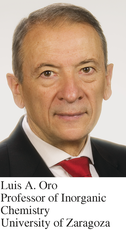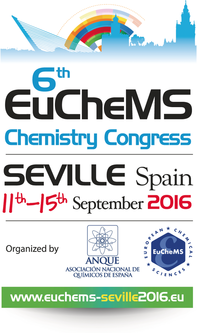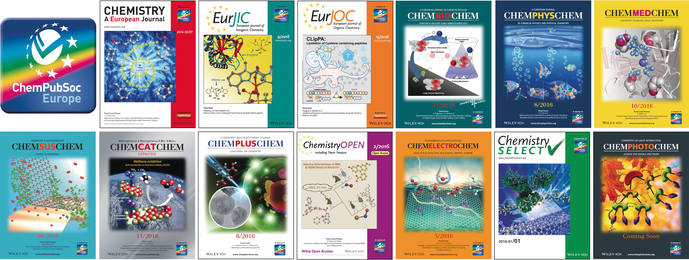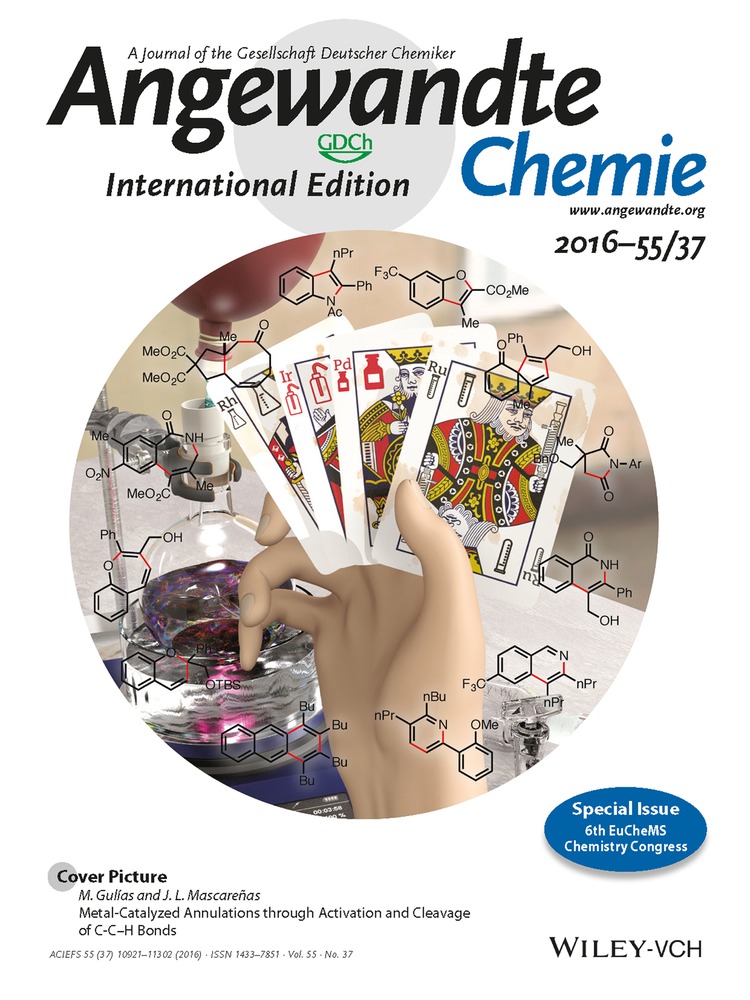Chemists Creating a European Identity through Conferences and Journals
Graphical Abstract
“ … The 6th EuCheMS Chemistry Congress will take place in Seville in September 2016. EuCheMS represents more than 160 000 chemists from more than 40 member societies. ChemPubSoc Europe is an organization of 16 European chemical societies from 15 countries. These initiatives have contributed significantly to the creation of a European identity for chemistry …” Read more in the Editorial by Luis A. Oro.
 Chemistry is widely acknowledged as being crucial to underpinning economic growth and global sustainability. Ten years ago, in 2006, the first European Association for Chemical and Molecular Sciences (EuCheMS) Chemistry Congress was held in Budapest. Around 2300 participants from more than 50 countries attended this inaugural congress. Since then, these European congresses have been co-organized biennially by various national chemical societies in Torino (2008; Società Chimica Italiana), Nuremberg (2010; Gesellschaft Deutscher Chemiker; GDCh), Prague (2012; Česká společnost chemická), and Istanbul (2014; Türkiye Kimya Derneği). There is no doubt that these European events have become an eminent scientific platform for both the European chemical community and their guests from abroad, aiming to facilitate discussion that will further strengthen the case for chemistry in Europe and stimulate a flow of ideas, opportunities, and solutions that can benefit chemistry and mankind. Attendance is usually well over two thousand participants from about sixty countries. In September 2016, the 6th EuCheMS Chemistry Congress will be held in Seville, a lively city with a rich culture, located in Andalucía, in the south of Spain.
Chemistry is widely acknowledged as being crucial to underpinning economic growth and global sustainability. Ten years ago, in 2006, the first European Association for Chemical and Molecular Sciences (EuCheMS) Chemistry Congress was held in Budapest. Around 2300 participants from more than 50 countries attended this inaugural congress. Since then, these European congresses have been co-organized biennially by various national chemical societies in Torino (2008; Società Chimica Italiana), Nuremberg (2010; Gesellschaft Deutscher Chemiker; GDCh), Prague (2012; Česká společnost chemická), and Istanbul (2014; Türkiye Kimya Derneği). There is no doubt that these European events have become an eminent scientific platform for both the European chemical community and their guests from abroad, aiming to facilitate discussion that will further strengthen the case for chemistry in Europe and stimulate a flow of ideas, opportunities, and solutions that can benefit chemistry and mankind. Attendance is usually well over two thousand participants from about sixty countries. In September 2016, the 6th EuCheMS Chemistry Congress will be held in Seville, a lively city with a rich culture, located in Andalucía, in the south of Spain.
 The Scientific Committee, which is headed by Peter G. Edwards (University of Cardiff), has put together an exciting program that covers a broad spectrum of chemistry. The congress will focus on eight main themes: A) Education and Society, B) The Environment, Energy and Sustainability, C) New Chemical Compounds: Synthesis, Methods and Industrial Processes, D) Catalysis, Industry and Applications, E) Materials, Devices and Nanochemistry, F) Properties of Matter, G) Physical, Analytical and Experimental Methods in Chemistry, and H) Chemistry in the Life Sciences. In addition, several areas of current topical importance will also be addressed in round-table discussion sessions or workshops. The program will include approximately 130 speakers, including four Nobel Laureates (Ada Yonath, Richard Schrock, Aaron Ciechanover, and Jean-Marie Lehn), as well as Avelino Corma, Spain's most awarded chemist, and will involve a total of approximately 400 session lectures. The Seville meeting will be run by the Asociación Nacional de Químicos de España (ANQUE; National Association of Spanish Chemists) with the support and collaboration of the most important academic and industrial organizations, such as the Real Sociedad Española de Química (RSEQ; Spanish Royal Society of Chemistry).
The Scientific Committee, which is headed by Peter G. Edwards (University of Cardiff), has put together an exciting program that covers a broad spectrum of chemistry. The congress will focus on eight main themes: A) Education and Society, B) The Environment, Energy and Sustainability, C) New Chemical Compounds: Synthesis, Methods and Industrial Processes, D) Catalysis, Industry and Applications, E) Materials, Devices and Nanochemistry, F) Properties of Matter, G) Physical, Analytical and Experimental Methods in Chemistry, and H) Chemistry in the Life Sciences. In addition, several areas of current topical importance will also be addressed in round-table discussion sessions or workshops. The program will include approximately 130 speakers, including four Nobel Laureates (Ada Yonath, Richard Schrock, Aaron Ciechanover, and Jean-Marie Lehn), as well as Avelino Corma, Spain's most awarded chemist, and will involve a total of approximately 400 session lectures. The Seville meeting will be run by the Asociación Nacional de Químicos de España (ANQUE; National Association of Spanish Chemists) with the support and collaboration of the most important academic and industrial organizations, such as the Real Sociedad Española de Química (RSEQ; Spanish Royal Society of Chemistry).
EuCheMS (http://www.euchems.eu/), which is responsible for these congresses, was established in 2006, taking over the role and responsibilities of the Federation of European Chemical Societies, created in 1970. EuCheMS aims to nurture a platform for scientific discussion and to provide a single, unbiased European voice on key policy issues in chemistry and related fields. It represents more than 160 000 chemists from more than 40 member societies and other chemistry-related organizations. I had the privilege to serve as EuCheMS president from 2008–2011, with the vision of creating a European identity among chemical societies and two major goals, namely the development and initial execution of the EuCheMS strategy for 2009–2013, and to establish EuCheMS as an independent and functional organization based in Brussels. EuCheMS is currently registered in Belgium as an international not-for-profit association. Through the promotion of chemistry and by providing expert and scientific advice, EuCheMS aims to take part in the solution of today's major societal challenges. Particularly relevant is the activity of the scientific divisions and working parties that create networks in their own fields of expertise, promote collaboration with other European and international organizations, and organize high-quality conferences. David Cole-Hamilton, emeritus professor at the University of St Andrews, is the President from 2014–2017, and Nineta Majcen is the General Secretary.
The publishing landscape of the continental European chemical societies has also changed significantly in the last twenty years. It has moved from the fragmented traditional local-language journals, to a more innovative modern concept. In the early 1990s, 16 continental European national chemical societies published 15 chemistry research journals that no longer exist today. An important development in the continental chemistry scene was made in 1998. The seminal bilateral cooperation agreement between GDCh and the Koninklijke Nederlandse Chemische Vereniging that enabled the publication of Chemische Berichte/Recueil and Liebigs Annalen/Recueil was successfully expanded, in 1998, by an agreement with the chemical societies of France, Italy, Belgium, Spain, Portugal, and Greece to bring together their journals to create two truly European journals, the European Journal of Inorganic Chemistry and the European Journal of Organic Chemistry. In the same year, these chemical societies became co-owners of Chemistry—A European Journal, founded in 1995 by the Gesellschaft Deutscher Chemiker and Wiley-VCH, upon encouragement of Jean-Marie Lehn and Peter Gölitz. This initial consortium rapidly expanded through agreements with the chemical societies of Hungary, Czech Republic, Poland, Sweden, Austria and, more recently, Switzerland. I have had the privilege of participating in this organization of European national chemical societies—ChemPubSoc Europe—since the very beginning. Nowadays, ChemPubSoc Europe is an organization of 16 European chemical societies from 15 countries, representing over 70 000 members. The amalgamation of 15 national chemical journals resulted in the formation of 13 high-quality European journals, all published in English. ChemPubSoc Europe also publishes the ChemViews Magazine. All the participating societies, most of which were founded more than a century ago, share a commitment to scientific excellence, and to publishing ethics, adopting the EuCheMS Ethical Guidelines for Publication in Journals and Reviews. The ChemPubSoc Europe family of journals, published with Wiley-VCH, are shown below, and ChemPhotoChem is the newest member of the family. In most cases, the GDCh flagship journal Angewandte Chemie has been used as a carrier journal in the start-up phase.
A large number of Spanish chemists are expected to attend the EuCheMS Chemistry Congress in Seville. Chemical research in Spain has also changed significantly in the last decades, and has experienced rapid and positive progress. Various metrics clearly support this statement. Based on the number of published documents, Web of Science placed Spanish chemistry as eighth in the world (close to 4 % of the world total). This position is improved to seventh when considering the number of citations. These parameters placed Spanish chemistry among the most successful scientific areas at the national level, and rank it well in the European scenario, namely in fourth position after Germany, the UK, and France. Spanish chemistry is thus fully integrated into the European framework.
Over the course of a few decades, EuCheMS with its congresses, and ChemPubSoc Europe with its journals have contributed significantly to the creation of a European identity for chemistry. Thirty-five pioneers of journal Europeanization (and internationalization) will be honored as ChemPubSoc Europe Fellows at the upcoming EuCheMS Congress, and I look forward to welcoming many readers of Angewandte Chemie to Seville in September. Postscript added after online publication: This Editorial was written before the “Brexit” vote took place. The decision of the UK to leave the EU is certainly bad news for the European identity for chemistry, and for higher education in general. Over the years, the added value of working together has been consistently demonstrated. Any failure to maintain the free exchange of ideas and people between continental Europe and the UK could be harmful for science, in general, and chemistry, in particular.






